The Hanseatic League
The Hanseatic League was an alliance of merchant cities along the North Sea and Baltic Sea, that established and maintained a trade monopoly over nearly all of northern Europe and the Baltic region. It encompassed about 100 cities, with Lübeck as its center - an actual feature within the game.
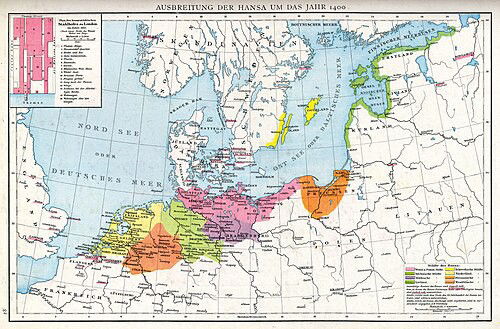
At first, the League had a mostly economic focus, but it later became a wide political alliance.
With the maritime discoveries of Portugal and Spain, and the discovery of America and the sea route to India, in the 15th and 16th centuries, the world's trading routes changed focus, leading to the decline of the Hanseatic League, until it disappeared around the 17th century.
Let's get to know the game!
Hansa - Game Info
Hansa is a 2-to-4 players game, age 10+, by designer MIchael Schacht, who's also responsible for the game's art.
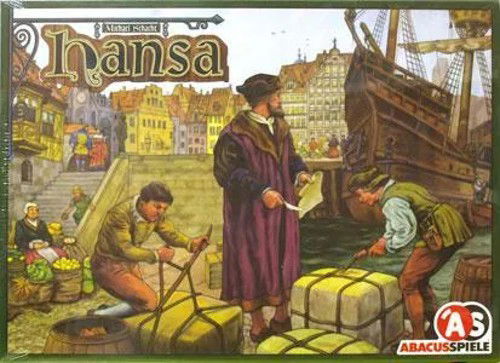
Hansa was released in 2004 by Abacusspiele. The main mechanics are: gathering sets, space-by-space movement, pick up and deliver, and action points.
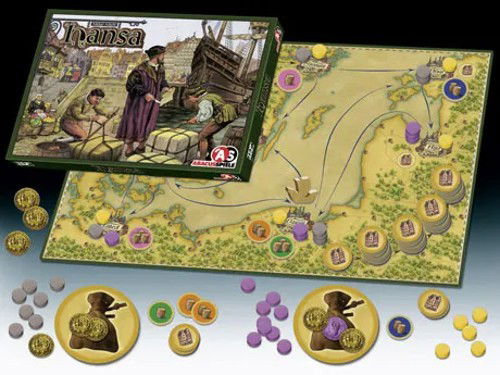
Hansa has received some important award nominations:
- the Meeples Choice Award;
- the Japan Boardgame Prize, for Best Advanced Game;
- the International Gamers Awards, for General Strategy and Multiplayer Game.
Let's play!
The Game
Playing as a merchant aboard a trading boat through the Baltic Sea, you seek to expand your business: trade goods, establish market booths and commercial routes, so you can increase your power and prestige among fellow merchants.
Since you share the boat with others, each one will have their chance to decide where to set sail - and it will often go away from your expected route. So, you'll have to manage your opportunities and make the most out of each route, or else you'll fall behind your competitors on the same boat.
This is the background for Hansa!
At the beginning of the game, the merchant ship departs from Copenhagen. Each player receives 3 Talers (the game's currency) and strategically positions two market booths in three different cities, excluding Copenhagen. In other words, you're already planning your commercial route from the start!
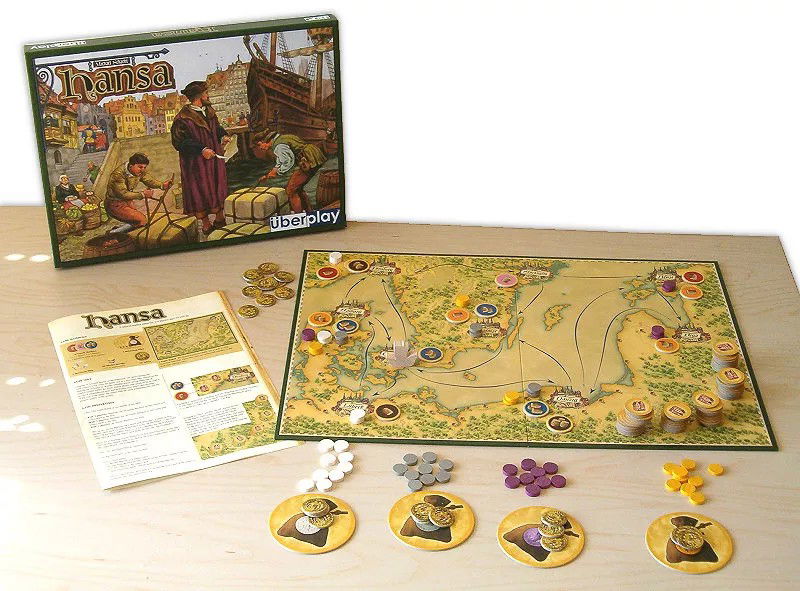
A turn in Hansa has 4 phases:
- Phase 1: Collect Income;
- Phase 2: Replenish Goods Markers;
- Phase 3: Perform Actions;
- Phase 4: Taxes and Tolls.
In Phase 1, at the start of the round, each player receive 3 Talers as Income.
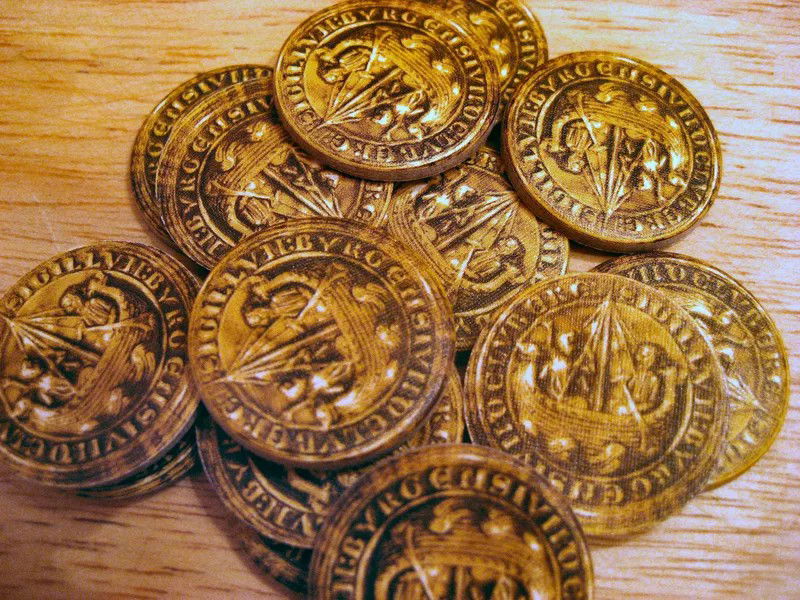
Phase 2 can be optional or not:
- Optional: When the city warehouses are missing goods tokens and the player decides to replenish them. This costs 1 taler;
- Mandatory: When all city warehouse spaces on the map are empty. In this case, they must be replenished, and it will also cost 1 taler.
To replenish, simply take the goods tokens and place them in the cities that do not yet have any goods. Remember to take them from the first pile of goods (the leftmost one). This is important because, when you need to take tokens from the fifth pile, the game will end.
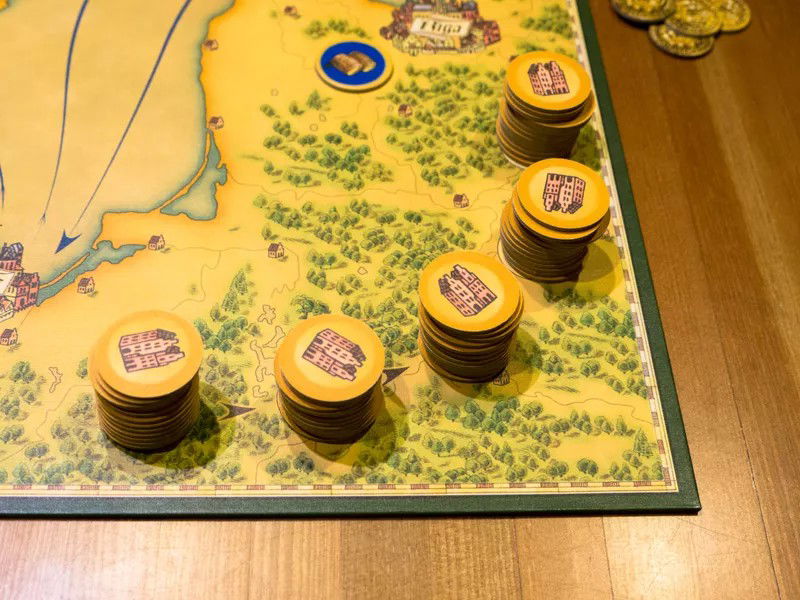
Phase 3 is one of the most important. After all, it's time to perform actions in the game. There are four possible actions, and you can do as many as you want, with one restriction: only one action in each city.
One possible action is to Sail the Boat as indicated by the arrows on the map. The cost is 1 Taler per movement.
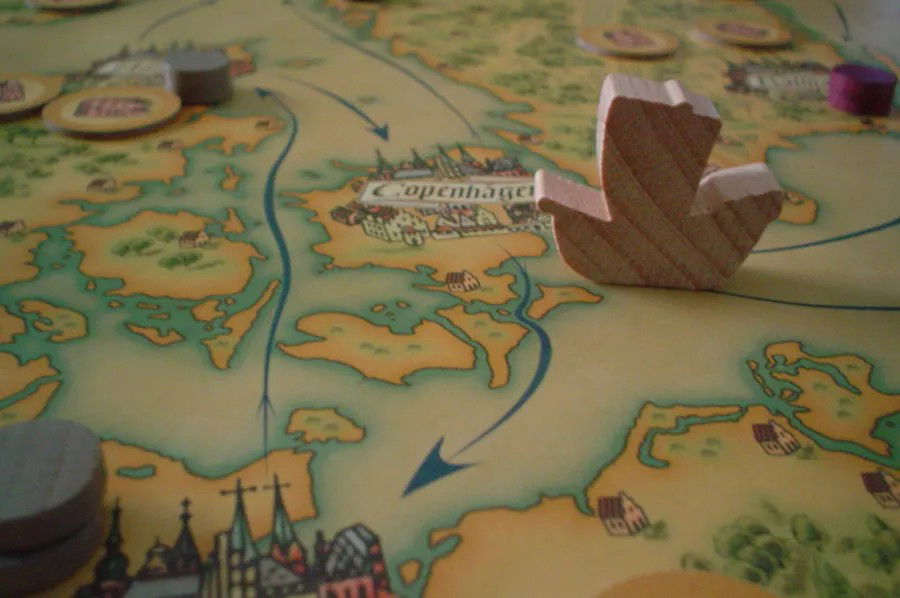
Another action is Buy Goods. This action allows you to purchase 1 Goods token where the ship is currently anchored. You pay 1 Taler to the player with the most Market Booths at the city, or to the bank if there is a tie in the number of Booths, or if there are none. Note that if you are the player with the most Market Booths, you won't pay anything—it's free!
The third action is Selling Goods. You'll need to have at least 2 of the same Goods token to do this, and only where you control a trading post. Once you sell, remove your trading post from the city, and flip over the Goods token to show you sold it.

After sellling goods, if another player has any unsold tokens of the same color, they lose 1 Goods token of that color.

Finally, the fourth action allows you to Establish Market Booths. You'll be able to place up to 3 Markes Booths where the boat is anchored, by paying with one of your Goods token. Each barrel printed on the token allows you to place 1 Booth, to a maximum of 3.
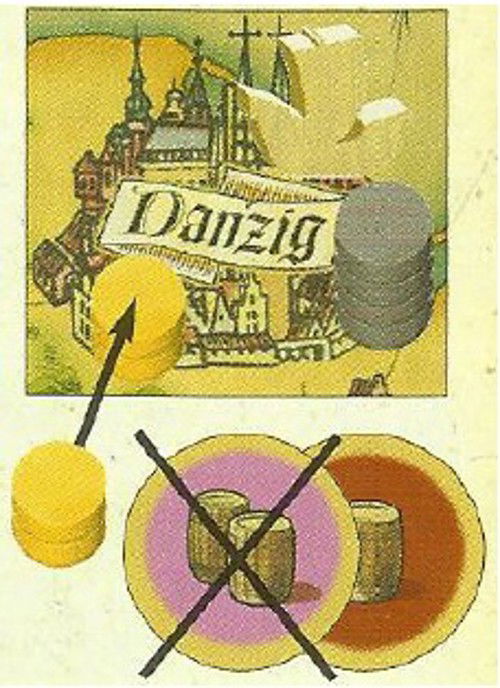
Phase 4 is Taxes and Tolls. This only occurs one a player ends their turn. You're allowed to finish the turn with up to 3 Talers and 3 Goods tokens. If you have any surplus money or goods, you must:
- returned excess Talers to the bank;
- remove excess goods tokens from the game.
Play resumes withthe player to the left. And so begins a new turn in Hansa!
Ending the Game
The end of the game is triggered when, in Phase 2, there is a need to Replace Goods Tokens and a token from the fifth pile is used. The player who triggers the end of the game takes their turn normally, and the other players still have one more turn, so that everyone has played the same number of rounds.
Scoring is very simple:
- 1 point for each unsold goods token;
- 1 point for each goods token sold, plus the value printed on the good token itself;
- 2 points for each city where the player has at least 1 market booth OR 4 points if there is a monopoly.
The player with the most victory points is the winner. In the event of a tie, the player with most market booths on the board wins. If the tie persists, the players share the victory.
Strategy Tips
Hansa is highly strategic, right from the game's setup, since you can place market booths in three different cities. From the beginning, you need to strategically develop a network, and boost your trades.
Phase 1, Income, gives you three Talers at the start of each turn. So, if you want to perform multiple actions in a turn, try to save some Talers the previous turn. If you're lucky, you'll get some Talers from opponents, that will pay you for buying goods in cities where you have the most Market Booths. This will dictate how many actions you'll do in a turn, so be careful with your money.
Phase 2 deserves special attention, as Replenish Goods is very important. However, you need to carefully assess the board. Is it really necessary to replenish now? Be careful or you'll end up supplying the market for your opponents! Personally, I recommend replenishing only when there are currently no Goods you're interested in buying. On the other hand, if everything is empty, there's no choice... it's mandatory to replenish.
In Phase 3, which is when you Perform Actions, it's essential to have enough Talers to execute your game plan. Otherwise, you'll need to rethink your strategy, as more Talers mean more flexibility.
When you Sail the Boat, be careful not to leave it in a favorable position for the next player. Remember that this will determine where the next turn's actions begin.
When you Buy Goods, try to prioritize locations where you have the most Market Booths, as it will be free. If it isn't possible, try to buy goods where you'll pay to the bank, so you won't benefit an opponent. Remember that goods tokens are essential, as they serve two purposes: they help establish more Market Booths, and, when sold, will yield victory points at the end of the game.
Whenever possible, keep at least two tokens of the same goods. This will allow you to Sell Goods. You can even sell more than one type of goods in a single sale, as long as you have at least two tokens of each goods.
Selling goods is a highly strategic action that also protects your tokens. Otherwise, they will be exposed, since when another player sells goods of a type you own, you will be forced to discard one token of that type. So, use them wisely:
- sell quickly to protect your tokens and secure points at the end;
- or, use them to build trading posts.
Placing Market Booths, is vital to a smooth game. Build a network of booths, because it allows you to buy goods without paying your opponents, and also to sell wherever your ship is anchored. Players who do not place Booths will face increasing difficulties to sell goods. Furthermore, they will miss out on opportunities to earn extra Talers or free Goods tokens.
Finally, Phase 4, Taxes and Tolls, needs attention. If you want, and have the opportunity, to perform lots of actions during your turn, spend all your talers. However, sometimes your turn isn't the best: either the ship is far away, or you don't have enough tokens, or perhaps your Booths aren't nearby - in that case, save Talers. Pay taxes and tolls, if necessary, and hope for a better next turn. At the very least, you'll have more money available.
Based on these tips, develop your best strategy, choose the best routes, build a network of Market Booths, and win in Hansa!
Rules and Gameplay videos
Rules:
Gameplay:
Pedagogical Tips
If you're looking for a highly interactive and strategic game, full of decision-making, with a strong historical appeal, and with several important stimuli for children, Hansa is the ideal game!
Start by showing the map and telling the story of the Hanseatic League. It'll be fun to navigate the map using the in-game boat or even pointing with your finger along the sea routes where trades took place in the Baltic Sea. It's a history lesson!
The game is highly interactive, as all players are in the same boat. Therefore, one player's decision influences everyone else's. This creates hilarious moments, as someone is sure to steer the boat in the opposite direction of what another player would like. This interaction means you'll hear complaints and frustrations, but it will also bring laughter and fun.
Everything in Hansa involves strategy, decision-making, choices, and logical-mathematical reasoning. For example:
- strategically deciding the ship's destination;
- setting up a market booth;
- buying goods;
- selling goods only in places where you have market booths;
- spending or saving Talers.
These are just some of the many important stimuli that children will have without realizing it, playing in an educational way.
Hansa is easy to explain and understand. Furthermore, it is language-independent due to its iconic components, which eliminates any reading barriers. Practical and fun!
From a pedagogical perspective, Hansa stimulates skills such as strategy, management, decision-making, logical-mathematical reasoning, and even teaches history, all while being fun.
I recommend Hansa for your collection!!!








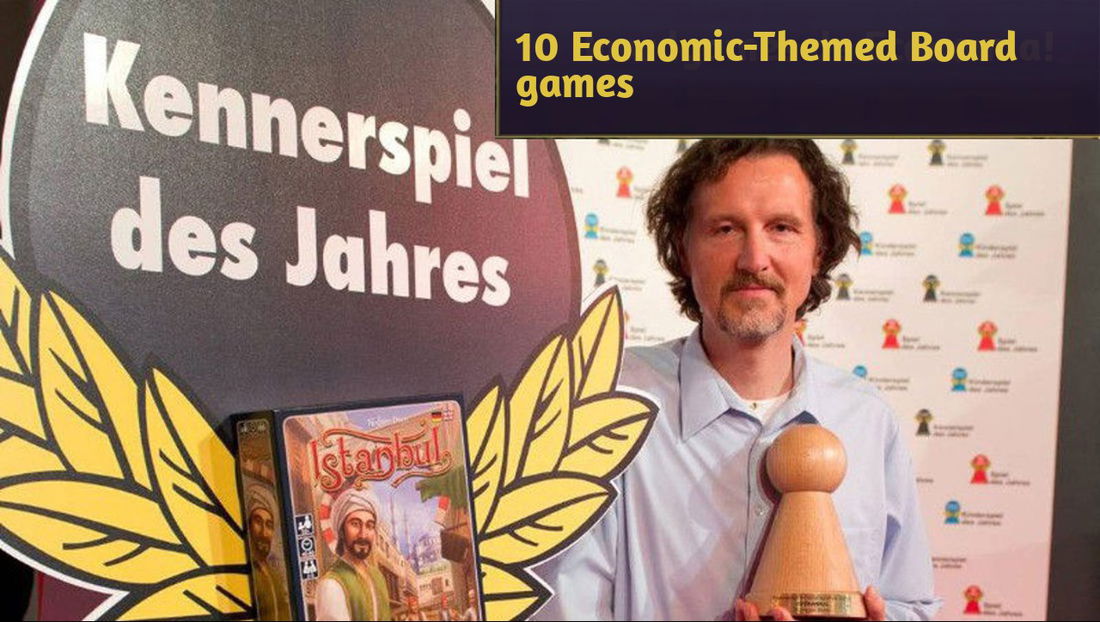



— 评论 0
, 反应 1
成为第一个发表评论的人